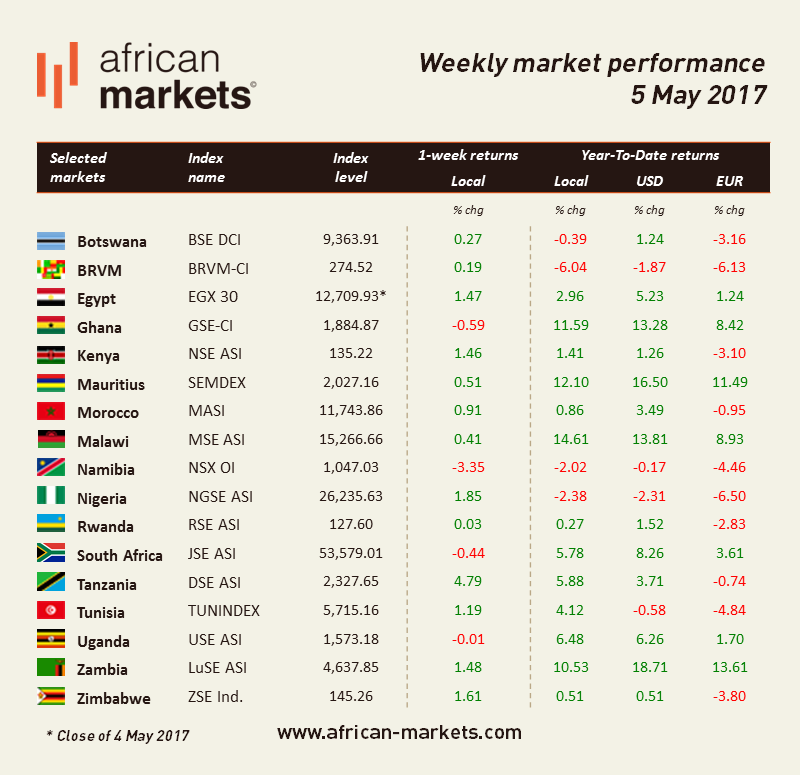Overall a good week on African Markets with most of the indices closing in green territories. The positive trends seen recently seems to continue.
The NSE gained 1.46%. Kenya’s central bank has announced that twelve parties, including local and foreign banks, have expressed interest in taking a stake in Kenya’s Chase Bank. Chase Bank had been placed under receivership since April 2016 after a loss of billions of Kenyan shillings. The central bank is looking for a strategic investor for Chase but has not mentioned the size of the stake it will sell.
The NGSE gained 1.85%. Nigeria’s central bank prevented some lenders from purchasing dollars at foreign-currency auctions they failed to sell foreign-currency to small and medium-sized customers. To limit foreign-currency shortages, the regulator holds specific foreign-exchange auctions for SMEs in which lenders can only bid for dollars if they possess orders to support the purchases. 8 banks among which Access Bank, Diamond Bank and Zenith Bank were banned from the auction this week. Also in Nigeria, news came that the central bank has been working to make the exchange rates for its currency converge on the official and black markets and has been working to make the exchange rates for its currency converge on the official and black markets. The idea is to increase liquidity as a way to lead the multiple exchange rates currently used in the country to converge. The central bank’s governor Okorafor believes the bank has the capacity to sustain its intervention. Also this week, the country’s central bank has lifted a 2015 ban on currency allocation for importers bringing in goods worth up to $20,000 per quarter. The country plans to replace the list of 41 import items with more trade policy-driven restrictions taking into account items that are required as well as locally unavailable raw materials. In other news, President Buhari health is fuelling concerns as the president missed the cabinet meeting for the third consecutive time.
The Egyptian finance ministry reported that the budget deficit decreased by 7% on an annual basis from July 2016 to February 2017. The decline is due to higher revenues which increased by 22.6% against expenses that increased by 14.2%. The EGX30 gained 1.47%.
The JSE lost 0.44%. President Jacob Zuma has been ordered by South Africa’s High Court to provide reasons for his decision last month to fire finance minister Pravin Gordhan in a cabinet reshuffle that led to sovereign debt downgrades. In parallel, in a financial stability review, South Africa Reserve Bank has stated that “the possibility of further downgrades to South Africa’s local currency rating and South Africa consequently being excluded from the remaining bond indices is disconcerting”. According to the bank, should rating agencies further downgrade local currency debt, it could have a significant impact on investment flows and on the cost of funding. Local currency borrowing represents about 90% of the South Africa’s total 2.2 tn rand of debt.







































